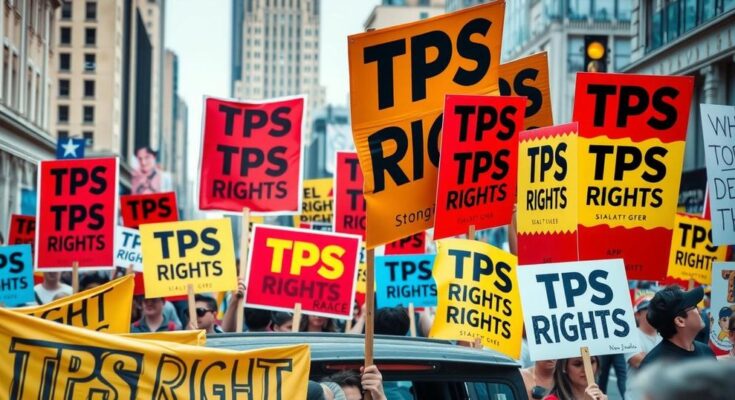Democratic lawmakers are protesting the Trump administration’s decision to terminate TPS for Venezuelans, claiming it contradicts humanitarian concerns. The letter to Secretary of State Rubio highlighted the discrepancy in claims about improvements in Venezuela. Over 607,000 Venezuelans await a court ruling regarding their legal status, amidst potential deportation threats and accusations linking them to gangs. Recent actions have raised alarms regarding fairness in deportation processes and the treatment of the Venezuelan community.
Democratic lawmakers expressed significant outrage concerning the Trump administration’s decision to terminate the Temporary Protected Status (TPS) for Venezuelans residing in the United States. This condemnation was articulated in a letter directed to Secretary of State Marco Rubio, highlighting the inconsistencies between the Department of Homeland Security’s assertion of improvements in Venezuela and Rubio’s own depiction of the Maduro regime as a serious threat to both Venezuelans and the international community.
Venezuelans currently in the U.S. are eagerly anticipating a court ruling that may extend the TPS for an additional 18 months, a move previously conferred by the Biden administration. The outcome could safeguard approximately 607,000 Venezuelan TPS holders from deportation and the loss of legal status. The initial hearing is scheduled for March 24, with a crucial April 2 deadline looming over more than 350,000 TPS holders.
U.S. Representatives Debbie Wasserman Schultz and Gregory Meeks spearheaded the letter, garnering support from Florida’s entire Democratic congressional delegation, which includes several prominent representatives. With over one third of the 903,000 Venezuelans in the U.S. residing in Florida, the state exemplifies the core of the Venezuelan-American community. Lawmakers from various states, including Texas and California, also rallied support for the cause.
The letter articulated that on February 5, the Homeland Security Department justified its TPS termination decision by claiming progress in Venezuela. However, only a day later, Rubio reiterated the severe conditions under the Maduro regime, which he described as imprisoning and torturing its citizens, emphasizing that Venezuela continues to pose a global threat.
The legislators characterized the potential deportation of thousands of Venezuelans back to a nation deemed an “enemy of humanity” as a grievous betrayal. They called for clarification regarding the conflicting assessments from DHS and Rubio’s perspective on Venezuela’s dire state.
Concerns heightened over the Trump administration’s treatment of Venezuelans, characterized by a series of executive orders classifying many as affiliates of the Tren de Aragua gang. Recent application of the Alien Enemies Act, a historic law rarely invoked, has faced considerable backlash, raising fears of unjust criminalization against a vulnerable demographic.
In direct relation to these policies, over 200 Venezuelans associated with the Tren de Aragua gang were deported to El Salvador, with families claiming these individuals lacked genuine gang affiliations. Reports suggest that deportees may endure profound mistreatment upon return, amplifying scrutiny over the deportation practices employed.
Senator Rubio disclosed in a statement that under Trump’s orders, the federal government executed the Alien Enemies Act for swift deportation of these individuals, branding the gang as a terrorist organization. This measure underscores the tensions tied to Venezuelan immigrant communities and their precarious status amidst escalating deportation initiatives.
In summary, the Democratic lawmakers’ vehement opposition to the termination of TPS for Venezuelans highlights alarming discrepancies within the imposition of U.S. immigration policies. As a significant number of Venezuelan nationals await critical legal determination regarding their status, the broader implications reflect serious concerns about humanitarian repercussions and the treatment of vulnerable populations being deported. The voices of the lawmakers, bolstered by communal support, emphasize the urgent need to reassess current policies while advocating for the welfare of individuals fleeing oppressive regimes.
Original Source: www.miamiherald.com




